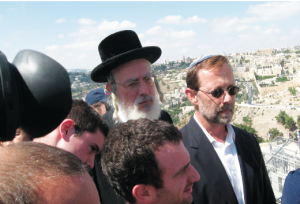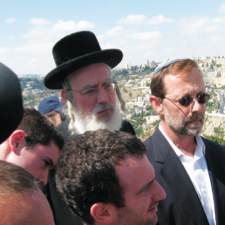HAMODIA – Israel Review, Sep. 17, 2104
by MENACHEM LUBINSKY

The problem of rock throwing in eastern Yerushalayim, including on the approaches to Har Hazeisim, was the subject of heated exchanges between Knesset members and highranking police officials during a tour of Har Hazeisim last Thursday.
The tour was organized by MK Miri Regev (Likud), chair of the Knesset’s Interior Committee, at the request of the International Committee for the Preservation of Har Hazeisim (ICPHH), and included MKs Yisrael Eichler (United Torah Judaism), David Azoulay (Shas), Motti Yogev (Habayit Hayehudi) and Moshe Feiglin (Likud), as well as Mayor Nir Barkat and Jerusalem District Commander Maj. Gen. Yossi Parienti.
Regev, who has been a leading voice for security on Har Hazeisim in particular and eastern Yerushalayim in general, challenged police officials: “Where is the police presence and the deterrence? Why do Jews have to be attacked with rocks because of Protective Edge? Citizens of the state must be able to travel safely, everywhere. The police must accelerate the pace of arrests.”
Rabbi Eichler also lambasted the police for not devoting enough manpower to the security of Har Hazeisim. “You know very well that if you want to, you can create an atmosphere of deterrence, and if there is a strong police presence, rocks will not be thrown.”
Feiglin gave examples of tough laws in the United States that mandate stiff sentences for people who vandalize cemeteries. “The State of Florida has a … mandatory jail sentence of 20 years for rock throwing, while here a perpetrator gets a slap on the wrist which might amount to three months at most. Why should we be any different than Florida? Do you understand that we are facing the Yerushalayim Intifada?” he asked Parienti.
Rock throwing has become commonplace in many areas of Yerushalayim. Recently, Arab rioters threw rocks and Molotov cocktails at a French Hill gas station, destroying the store located there and narrowly failing to set the gasoline tanks on fire. They damaged the fuel pumps and security cameras, stealing oil from the station and spilling it on the road leading to Issawiya before fleeing the scene. Arabs from the neighborhood of Issawiya carry out daily attacks on students studying at the adjacent Hebrew University campus and on Jews in general.
Parienti and police officials blamed a lack of manpower and such events as the murder of an Arab youth, Mohammed Abu Khdeir, as well as Ramadan and Operation Protective Edge. But Regev retorted: “It is unacceptable that every time the Arabs are unhappy about something, Jews should be stoned.”
Harvey Schwartz and Jeff Daube, leaders of the Israeli chapter of the ICPHH, pointed out that even arrested Arab youths was just a walk through the revolving door, “again only reinforcing the lack of deterrence.”
The tour and hearings that took place on Thursday were already postponed twice before, once during the disappearance of the ill-fated youths, Hy”d, and then again during Protective Edge.”
Avrohom Lubinsky, chairman of the ICPHH, said that despite the recent violence in eastern Yerushalayim, Har Hazeisim was largely spared from any major grave desecrations or rock throwing. He credited police officials on the mountain, headed by Capt. Avraham Saar. He said that despite the police presence and the 137 surveillance cameras, “the approaches to Har Hazeisim remain a big problem that can only be addressed by additional cameras and a more robust police presence.”
Mr. Lubinsky thanked Regev “for taking the lead on the issue of security on Har Hazeisim.” The Knesset member said she would not rest until full security was restored to eastern Yerushalayim. “I can promise you this — that I will not rest until Jews can walk all over eastern Yerushalayim without fear during the day and night.”
The ICPHH has been working with the government and the Jerusalem Municipality on a number of security and development initiatives. The Cabinet in July approved a budget of NIS 300 million over the next five years for security in eastern Yerushalayim, including the opening of a new police station (Marchev Kedem), the hiring of 70 officers, and installation of new surveillance cameras. In addition, the Cabinet agreed to draft a new law with a stiff sentence for rock throwing.
On the development front, many new projects are on the drawing board, including a visitors’ center and shul on Har Hazeisim, a cable car and light rail, as well as many improvements in the infrastructure. The ICPHH will be participating with the government in funding many of these projects, including the restoration of some 30,000 graves.





